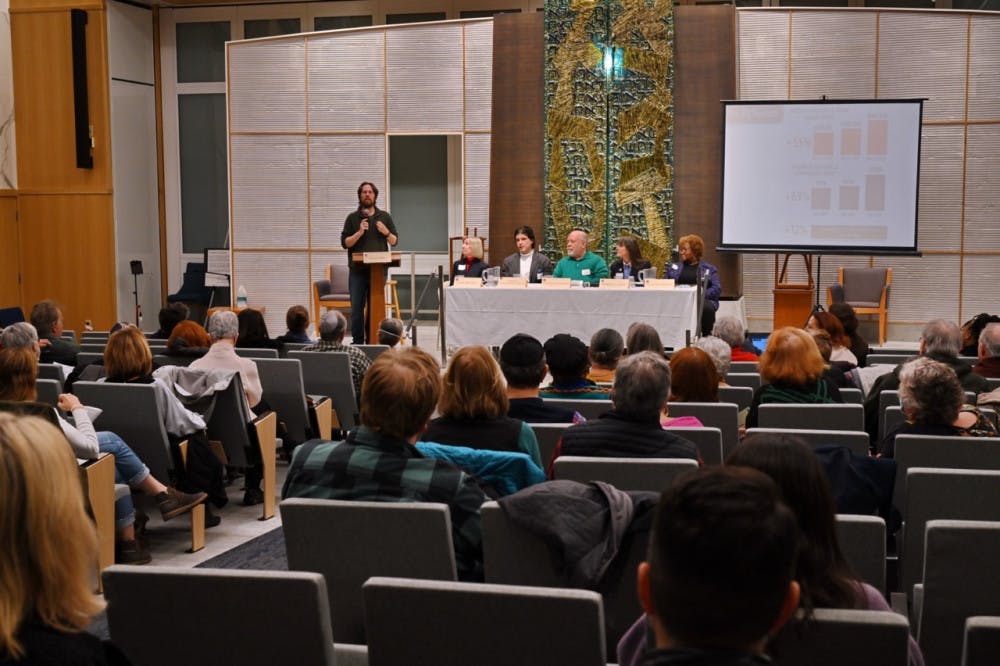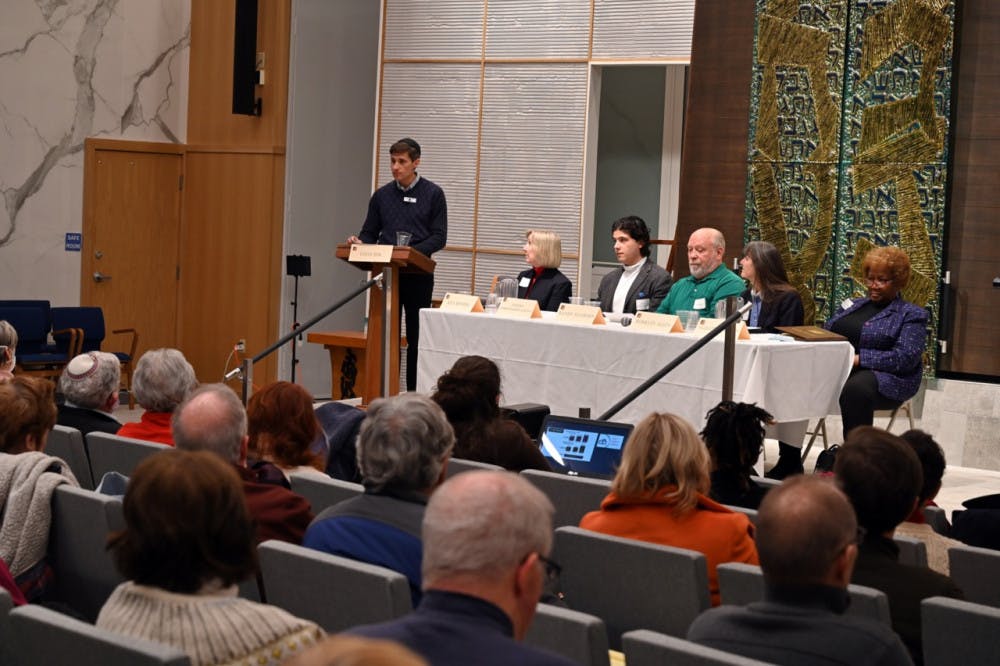
Rabbi Joshua Kullock of West End Synagogue welcomes attendees to the Affordable Housing Forum. Photo credit: Rick Malkin
Affordable Housing is Becoming Scarce in Nashville: What does this mean for the Jewish Community?
Nashville’s popularity as an “it” city continues to rise, and companies like Amazon and Oracle are bringing an influx of jobs. Despite this growth, finding affordable housing is fast becoming an insurmountable obstacle for most workers.
A recent affordable housing forum sponsored by West End Synagogue’s Social Action Committee, and attended by people from throughout Nashville, brought the statistics into sharp focus. Kay Bowers, affordable housing chair of Nashville Organized for Action and Hope (NOAH), who was a panelist at the forum, began by explaining what constitutes affordable housing. “For housing to be considered affordable, a person should be spending about one-third of their income,” she said, “Right now the problem is the gap between income and housing cost.” Out of approximately 480,000 jobs in Nashville, 260,000 workers earn below $20 per hour and 211,000 workers earn below $18 per hour.
According to Bowers, those most affected by what she calls, “The Big Squeeze,” are seniors, young people, and low-income workers. Statistics she presented from NOAH show that between 2018 and 2022 wages have increased in Nashville by 12%. During that same time period, apartment rents increased by 63% and home sales prices increased by 55%. Additionally, said Bowers, 93% of apartment units built between 2021 and 2022 are luxury housing. “High home sale prices have pushed more people into the rental market,” she said.
Even for renters, the picture is bleak. NOAH’s statistics show 49% of renters are cost burdened. Antone Christianson-Galina, who was also a panelist and is involved with NOAH, says for young people like himself, it is discouraging to look toward the future. After graduating from the University School of Nashville and the University of Richmond, he spent time studying and living in London. When he returned, he found he could not afford to live on his own. “When I came back, I had to live with two roommates. I was disheartened because I thought I did everything right. I work hard, focus on making and saving money, but when I looked to buy a house, I couldn’t afford it.”
Christianson-Galina says he sees people getting pushed out of the market entirely or be forced to move farther from the city. He says there will be long-term implications. “People will be buying smaller houses, which means they might have smaller families. There might even be a labor shortage down the road because people can’t live and work here,” he said. He said the answer is creating density. “A lot of people love their community, they love where they are, but don’t want to build density. But if we want room for places where young people can live, we need to build.”
The problems with work force shortages are not just something far in the future. Randy Rayburn, owner of Midtown Café, says many restaurants do not have enough employees to work shifts and he has seen several long-standing establishments be forced to close. “Whisky Kitchen and Tavern had to close because they didn’t have enough people.” He said he was forced to sell his Cabana restaurant because of the shortages. “I was scared. I called my partner to discuss closing. We ended up selling it for pennies on the dollar.”

Metro Councilwoman Burkley Allen, also a panelist, discussed recommendations by the Mayor’s Affordable Housing Task Force to address the affordable housing issue. The recommendations include creating a Department of Housing, reducing zoning barriers, implementing tax incentives, and using public lands and buildings. She also cited legislative solutions, including implementing inclusionary zoning measures that would require every residential project to have low-income housing set aside, a move that was pre-empted by the state. “There is no silver bullet to solving this problem. It takes all of us,” she said. She referenced the Barnes Housing Trust Fund, created by Metro government in 2012 to set aside $15 million per year to provide grants for affordable housing. “The fund helps provide for thousands of units per year of affordable housing.”
These solutions, however, can run into resistance from all sides. Panelist Dr. Paulette Coleman is on the Board of Commissioners of the Metro Development and Housing Agency. She pointed to some external factors that impede progress. “First off, we are up against institutional buyers coming in and buying up properties wholesale. Then there is the stigma around the concept of affordable housing.” She said positive change takes time. “We’ve been clamoring for an affordable housing division for four mayoral administrations, and we finally got it.” Coleman also stressed the need to consider transit alternatives, “We need different attitudes about transportation. The south is very car centric.” Overall, she said any changes must be far reaching. “We need a comprehensive, systemic development plan that is coordinated anad vertical. Until we have that, we just have an ad hoc response, which is not how you make systemic change.”
For Nashville’s Jewish community, affordable housing close to places like synagogues and the Gordon Jewish Community Center is scarce. The result, according to Toni Jacobsen, Clinical Director of Jewish Family Service, is that families are moving farther away from the community. “If you’re a family, you’re not going to find anything near the Jewish community for less than $1,500 per month, and it will be more depending on where you look. It makes participating in the community very difficult.” Jacobsen says declining ability to participate results in people feeling less inclined to volunteer in the community and eventually becoming disengaged in the community.
Jessica Averbuch, CEO of Zeitlin Sotheby’s, said in an email that Nashville has one of the hottest housing markets in the country, and statistics show affordable housing is one of the weakest links. “Nashville passed the threshold of affordability, meaning on average the median income household in the region is paying around 33% of their income if they were to purchase the average price of a house on the market. However, Nashville is still considered relatively affordable compared to other major U.S. metro areas.” Averbuch says that although there is more demand than supply, there have been on average 25 sales per month in the neighborhoods surrounding the Jewish community’s landmarks like the Gordon JCC. And for rentals, the picture is relatively the same. “The average rent for a one-bedroom apartment in Nashville is currently $1,799 and two bedrooms rent for $1,900 on average.” She says other options for affordable options can be found in North Nashville and Madison, both a bit farther from the Jewish community’s hub.
The West End Synagogue Social Action Committee urges people to ask their city council member to support a $30 million annual budget for the Barnes Fund. To learn more about affordable housing in Nashville, or to get involved in helping to find solutions, visit www.nashville.gov, and www.noahtn.org.
The Jewish Observer is published by The Jewish Federation of Greater Nashville and made possible by funds raised in the Jewish Federation Annual Campaign. Become a supporter today.
